Finding the perfect ratios for sleep-enhancing herbal tea blends can make your nights more restful. Start with 30% chamomile for its calming effects. Add 20% each of lavender and lemon balm for extra relaxation. Incorporate 15% valerian root and passionflower, which help ease anxiety and insomnia. Brew your tea using the right water temperature and steeping time to maximize flavor and benefits. Feel free to experiment with spices like ginger or cinnamon for added warmth and taste. The right blend is just a sip away, and you'll discover even more tips to perfect your herbal tea experience.
Benefits of Herbal Tea for Sleep
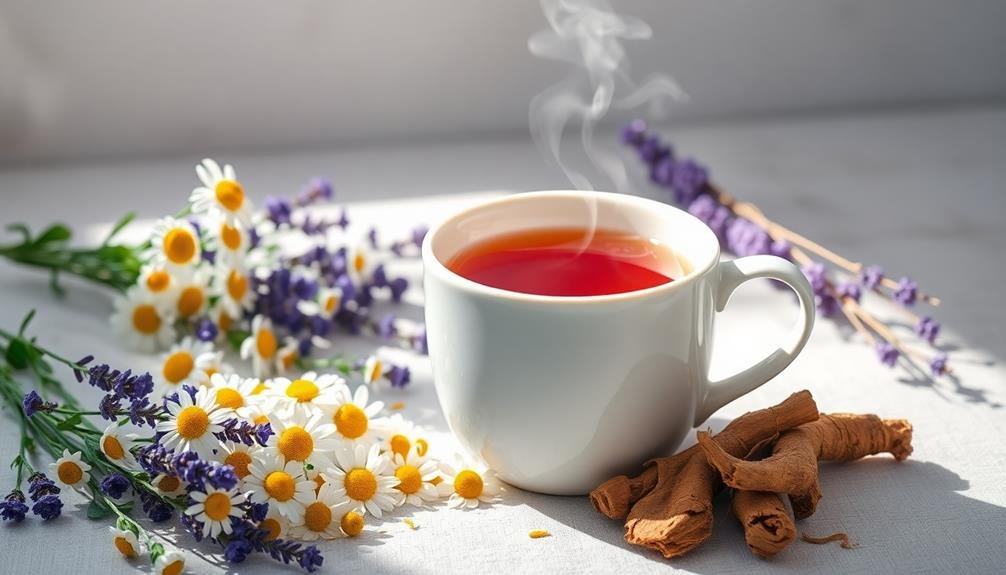
Drinking herbal tea before bed can greatly enhance your sleep quality. The soothing warmth of a cup can create a calming bedtime ritual, signaling your body that it's time to wind down. By incorporating herbal tea into your nightly routine, you'll likely find it easier to relax and let go of the day's stressors.
Herbal teas often contain compounds that promote relaxation, helping to quiet your mind and prepare you for restful sleep. When you sip on these blends, you're not just hydrating; you're also providing your body with natural compounds that work synergistically to enhance sleep.
Additionally, many herbal teas are caffeine-free, ensuring you won't have any disruptions in your sleep cycle. You may notice that certain blends can help reduce nighttime awakenings, allowing you to stay in deep sleep longer.
Moreover, the simple act of taking a moment for yourself with a warm cup can foster mindfulness, making it easier for you to shift from the hustle of the day to a peaceful night. Embracing this practice can lead to a more rejuvenating sleep experience, leaving you refreshed and ready to tackle the next day.
Key Ingredients to Consider
When selecting the right herbal tea for a restful night, it's important to know which ingredients can truly make a difference.
Look for chamomile, a classic choice known for its calming properties. It helps reduce anxiety and promotes relaxation, making it a staple in sleep-enhancing blends.
Another key ingredient is valerian root. This potent herb has been used for centuries to combat insomnia and improve sleep quality. If you struggle with falling asleep, consider adding it to your tea.
Lavender is also a fantastic addition; its soothing aroma can help you unwind and create a peaceful bedtime atmosphere.
Lemon balm, with its mild sedative effects, can further enhance your sleep experience. It's great for easing stress and anxiety.
Additionally, passionflower is worth considering; it may improve sleep quality by increasing levels of gamma-aminobutyric acid (GABA) in the brain, which helps calm your mind.
Classic Herbal Tea Combinations
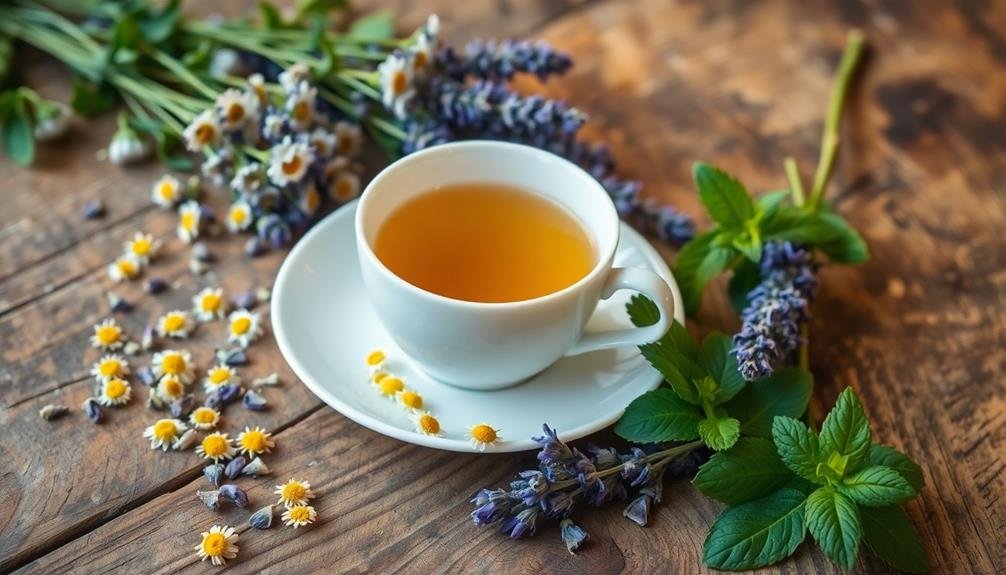
Classic herbal tea combinations can transform your bedtime routine into a soothing ritual. When you blend the right herbs, you create a comforting experience that helps you unwind after a long day.
Try mixing chamomile with lavender; this duo not only smells divine but also promotes relaxation and calmness.
Another favorite is lemon balm and passionflower. Together, they work wonders in easing anxiety and promoting restful sleep.
If you prefer something more warming, consider combining ginger with turmeric. This blend not only supports your immune system but also has anti-inflammatory properties that can help you feel cozy and relaxed before bed.
You might also enjoy a blend of peppermint and valerian root. Peppermint offers a revitalizing taste while valerian root is known for its sedative effects, making the combination an excellent pre-sleep choice.
Don't forget about the classic pairing of rooibos and cinnamon, which brings a naturally sweet flavor and adds warmth to your night.
Experiment with these combinations to find what soothes you best, and make your herbal tea ritual a delightful part of your bedtime routine.
Perfect Ratios for Relaxation
To craft the perfect herbal tea for relaxation, you need to understand how different ingredients work together.
Each herb brings unique properties, and the right ratios can enhance their calming effects.
Let's explore which combinations and brewing techniques will help you unwind effectively.
Herbal Ingredients Overview
Creating the perfect herbal tea blend for relaxation involves a careful balance of ingredients that work synergistically to soothe the mind and body. Knowing which herbs to include can greatly enhance your tea experience. Here's a quick overview of some common ingredients and their ideal ratios:
| Herb | Ideal Ratio |
|---|---|
| Chamomile | 30% |
| Lavender | 20% |
| Lemon Balm | 20% |
| Valerian Root | 15% |
| Passionflower | 15% |
Chamomile is renowned for its calming properties, making it a staple in many blends. Lavender not only adds a pleasant aroma but also helps reduce anxiety. Lemon balm brings a revitalizing touch and promotes sleep quality. Valerian root is a powerful sedative, while passionflower enhances relaxation without drowsiness.
When you combine these herbs in the suggested ratios, you create a harmonious blend that promotes tranquility. Experiment with slight adjustments to find your personal favorite mix, but stick close to these ratios for best results. Enjoy your journey to relaxation with each soothing sip of your herbal tea!
Brewing Techniques Explained
Brewing the perfect herbal tea requires more than just the right ingredients; it's all about technique. Start by measuring your herbs accurately. For a relaxing blend, use a ratio of one tablespoon of dried herbs per cup of water. This guarantees you get the best flavor and therapeutic effects.
Next, bring your water to a gentle simmer, ideally around 190°F (88°C). If your water's too hot, it can scald the herbs, leading to bitterness.
Once your water is ready, add your herbs and cover the pot. This traps the essential oils and aromas, enhancing the tea's calming properties.
Let it steep for 5 to 10 minutes, depending on your taste preference. The longer it steeps, the stronger the flavor. If you're using fresh herbs, you might want to reduce the steeping time slightly, as they're more potent.
Enhancing Flavor With Spices
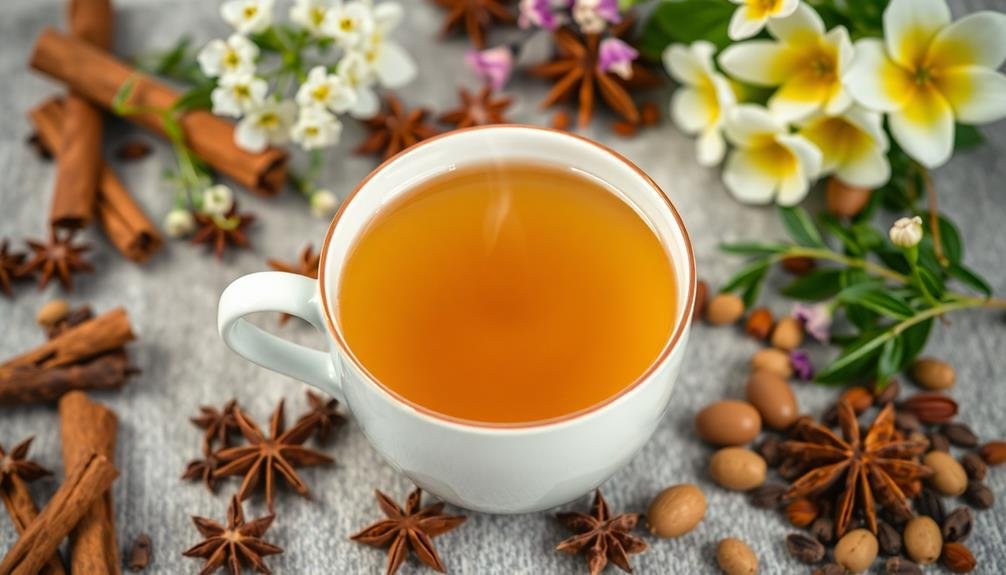
Adding spices to your herbal tea can elevate its flavor profile and enhance its calming effects. When you incorporate the right spices, you not only enjoy a delightful taste but also add potential health benefits. Here are three spices you should consider for your next blend:
- Cinnamon: This warming spice offers a hint of sweetness and can help regulate blood sugar levels, promoting a more restful sleep.
- Ginger: Known for its soothing properties, ginger provides a gentle spice that can aid digestion and reduce nausea, making your tea even more comforting.
- Cardamom: With its unique, aromatic flavor, cardamom can help relieve stress and anxiety, perfect for winding down at the end of the day.
Experimenting with these spices allows you to discover the perfect balance for your taste buds.
Try adding a pinch of cinnamon to chamomile or a slice of ginger to your peppermint tea. The key is to find a combination that not only pleases your palate but also contributes to a peaceful night's sleep.
Enjoy the process of blending flavors and savor each sip of your soothing herbal concoction.
Techniques for Blending Herbs
When you're ready to blend herbs for your sleep-enhancing tea, it's essential to keep a few techniques in mind. First, start with a base herb that promotes relaxation, like chamomile or valerian root. These will form the foundation of your blend.
Next, consider adding complementary herbs that can enhance the overall effect, such as lavender or lemon balm, which have calming properties.
Always measure your herbs carefully. A common ratio is one part base herb to one part complementary herb, but feel free to adjust based on your taste and desired effect. If you're experimenting, keep notes on your ratios and combinations so you can replicate successful blends later.
Another technique is to crush or chop the herbs slightly before blending. This helps release their essential oils, enhancing flavor and potency.
Finally, don't forget to smell your blend; aroma plays a significant role in the overall experience. Trust your instincts—if a combination smells inviting, it's likely to taste great too.
Brewing Methods for Optimal Effects
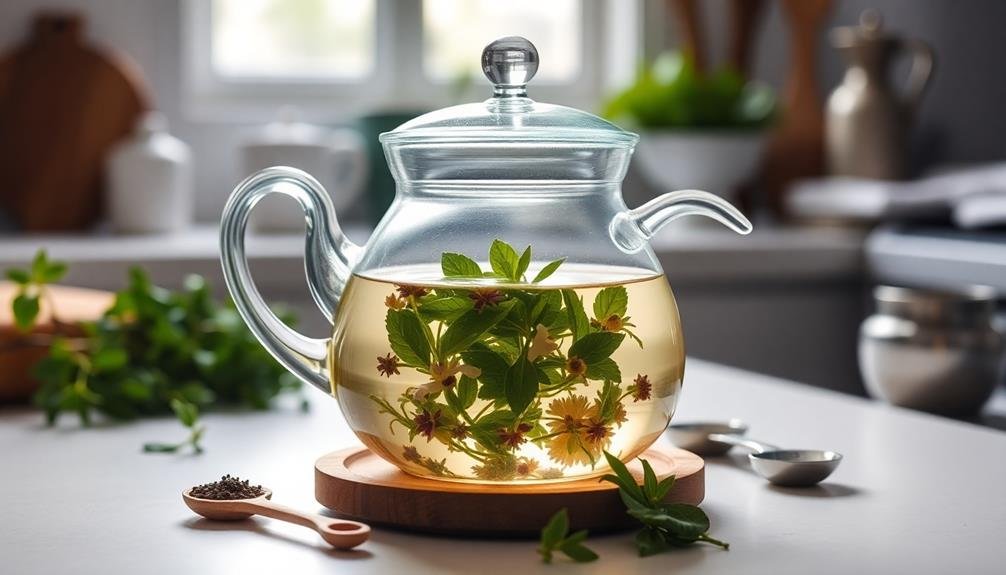
To brew the perfect sleep-enhancing herbal tea, you need to pay attention to water temperature and steeping time.
Each herb has its ideal conditions, which can greatly influence the tea's calming effects.
Additionally, pairing the right herbs together can enhance their soothing qualities, so let's explore how to get the best out of your blends.
Ideal Water Temperature
Achieving the perfect cup of sleep-enhancing herbal tea hinges on the ideal water temperature. Using the right temperature not only releases the full flavor of your herbs but also maximizes their calming properties.
Here's what you need to know about water temperature for brewing your tea:
- 90-95°C (194-203°F): This range is perfect for most herbal blends. It allows the herbs to steep effectively, extracting essential oils and nutrients that promote relaxation.
- 80-85°C (176-185°F): For more delicate herbs, like chamomile or lemon balm, a slightly cooler temperature preserves their subtle flavors while still allowing beneficial compounds to infuse into the water.
- Boiling Water (100°C / 212°F): While this temperature can be tempting, avoid it for most herbal teas. It can scorch the herbs, leading to bitter flavors and diminishing the soothing effects you're after.
Steeping Time Guidelines
Steeping your herbal tea for the right amount of time is essential for releasing its full potential. Too short, and you might miss out on the calming compounds; too long, and you risk bitterness or overpowering flavors. Generally, you should aim for a steeping time of 5 to 7 minutes for most herbal blends. This duration allows the herbs to infuse their beneficial properties effectively.
If you're using loose-leaf tea, consider using a tea infuser or strainer for easy removal at the right moment. For tea bags, simply monitor the clock and remove them once the time's up.
If you're experimenting with different blends, keep a notepad handy to track how varying steeping times affect the taste and aroma. You might find that some herbs need a bit longer or shorter to achieve your desired flavor profile.
Herbal Pairing Techniques
When crafting your sleep-enhancing herbal tea, pairing the right herbs can greatly amplify their calming effects. Understanding how different herbs interact can help you create a blend that works best for your needs. Here are three effective herbal pairing techniques:
- Complementary Effects: Choose herbs with similar calming properties. For instance, chamomile and lavender both promote relaxation, making them a perfect duo.
- Balanced Flavors: Consider the taste profile of your herbs. Combining mint with lemon balm not only enhances the flavor but also balances the tea's overall aroma, making it more enjoyable.
- Layered Benefits: Use herbs that target various aspects of sleep. For example, valerian root is great for promoting sleep, while passionflower can help reduce anxiety. This combination provides both relaxation and sleep support.
Experiment with these techniques to find the perfect blend for your taste and sleep goals.
Remember, the key is to start with small amounts, adjusting until you discover the ideal ratio that helps you unwind and drift off to dreamland.
Enjoy the process and savor each cup as you work towards a restful night's sleep.
Storing Your Herbal Blends
Your herbal blends deserve proper storage to maintain their freshness and potency. To achieve this, you'll want to keep them in airtight containers. Glass jars with tight-fitting lids work great, as they prevent moisture and air from degrading your herbs.
Avoid plastic bags or containers, as they can allow light and air to seep in, compromising quality over time.
Store your blends in a cool, dark place, away from heat sources like stoves and direct sunlight. A pantry or cupboard is ideal. If you can, consider using a dedicated shelf for your herbal teas to keep them organized and easily accessible.
Label each container with the blend's name and the date you made it. This way, you can track freshness and know when it's time to replenish. Ideally, use your blends within six months for the best flavor and benefits, although some herbs may last longer if stored correctly.
Lastly, avoid crushing or grinding your herbs until you're ready to use them. Keeping them whole preserves their essential oils and flavor, ensuring each cup of tea is as delightful as the last.
Proper storage will enhance your tea experience, one cup at a time!
Frequently Asked Questions
Can I Use Fresh Herbs Instead of Dried Ones?
Absolutely, you can use fresh herbs instead of dried ones! Just remember, fresh herbs have a stronger flavor, so you might need to adjust the quantity. Enjoy experimenting with different combinations for your perfect blend!
How Long Should I Steep My Herbal Tea?
You should steep your herbal tea for about 5 to 7 minutes. This allows the flavors and benefits to fully infuse. If you prefer a stronger taste, you can steep it a bit longer.
Are There Any Side Effects From Herbal Teas?
Yes, herbal teas can cause side effects like allergies, digestive issues, or interactions with medications. It's crucial to know your body's reactions and consult a healthcare professional if you're unsure about specific ingredients.
Can I Mix Different Herbal Tea Blends?
Absolutely, you can mix different herbal tea blends! Just guarantee the ingredients complement each other in flavor and health benefits. Experimenting can lead to unique tastes and enhanced effects, so don't hesitate to try new combinations!
What Time of Day Is Best to Drink Herbal Tea?
You should drink herbal tea in the early afternoon or evening. This timing helps you relax without interfering with sleep. Just remember, if you're sensitive, avoid caffeine-laden blends close to bedtime for better rest.
In Summary
Now that you know the benefits of herbal tea and the perfect ratios for relaxation, you're ready to craft your own sleep-enhancing blends. Experiment with classic combinations and add spices to elevate the flavor. Remember to use the right brewing methods for ideal effects, and store your blends properly to maintain their potency. With these tips, you'll create soothing herbal teas that help you unwind and enjoy a restful night's sleep. Happy brewing!

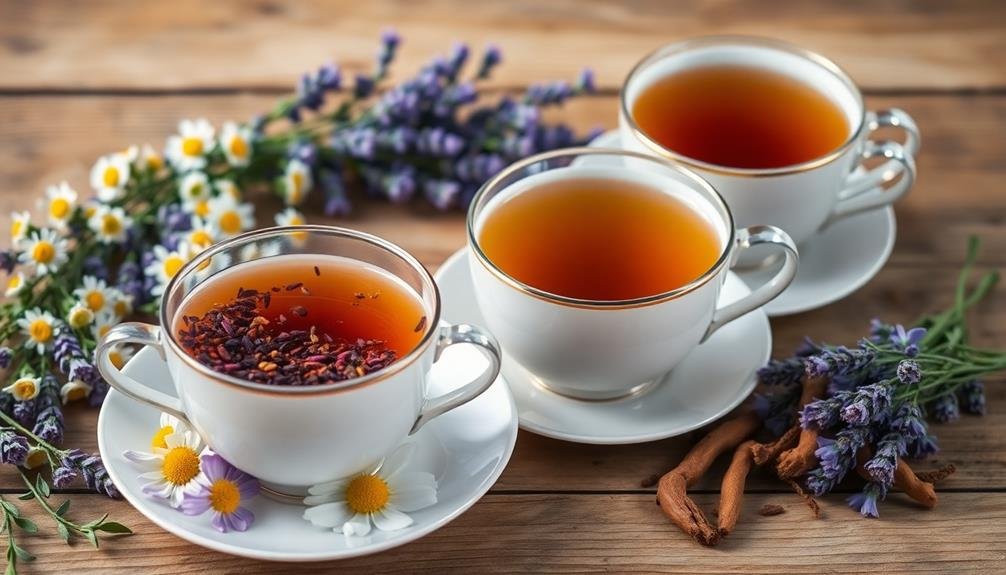
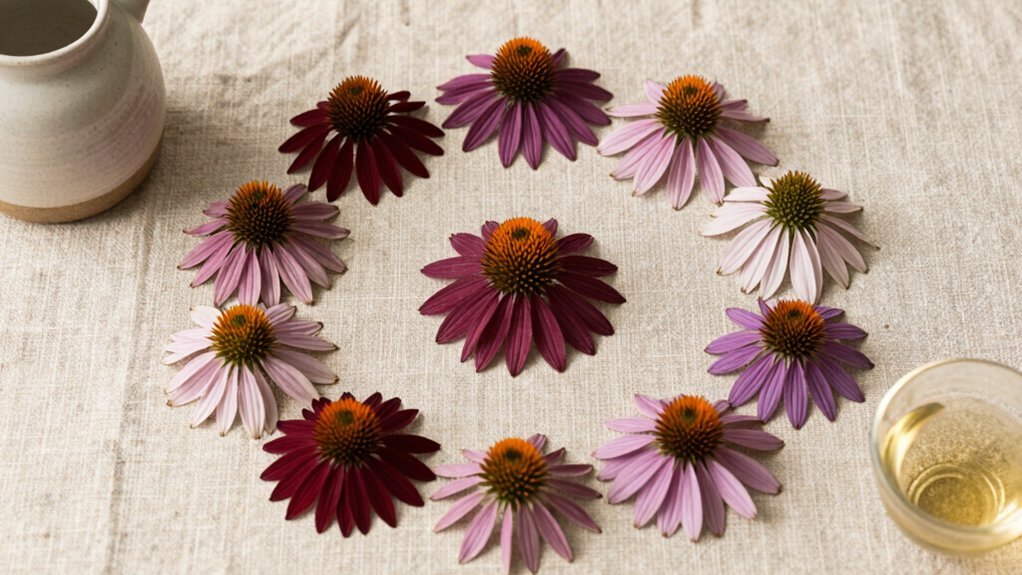
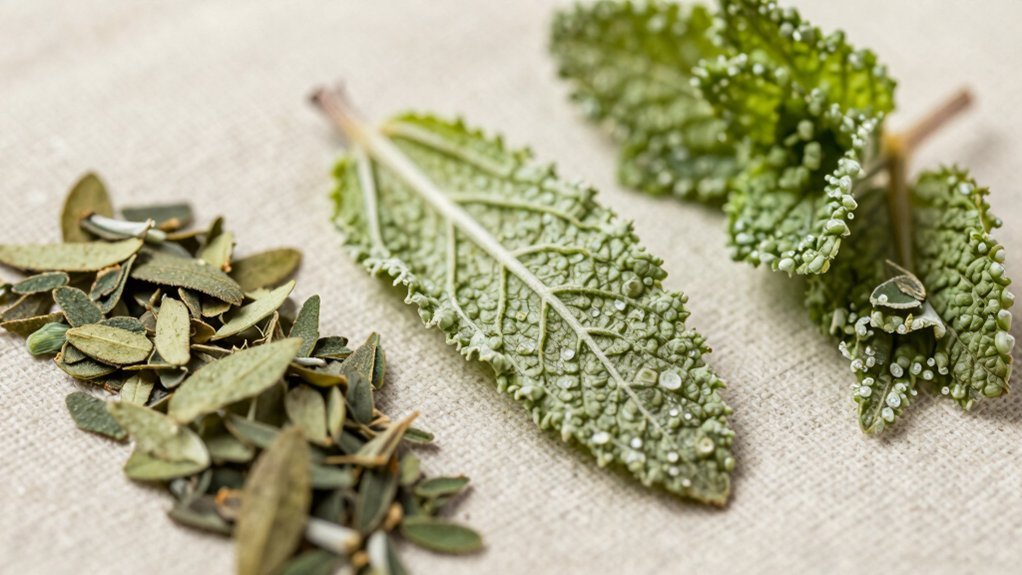

Leave a Reply